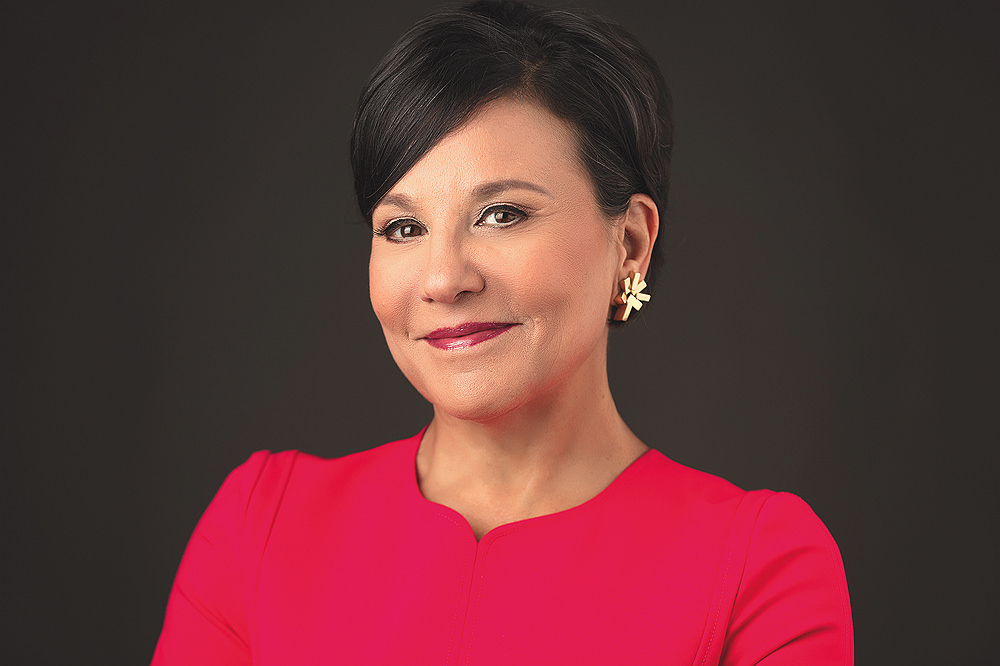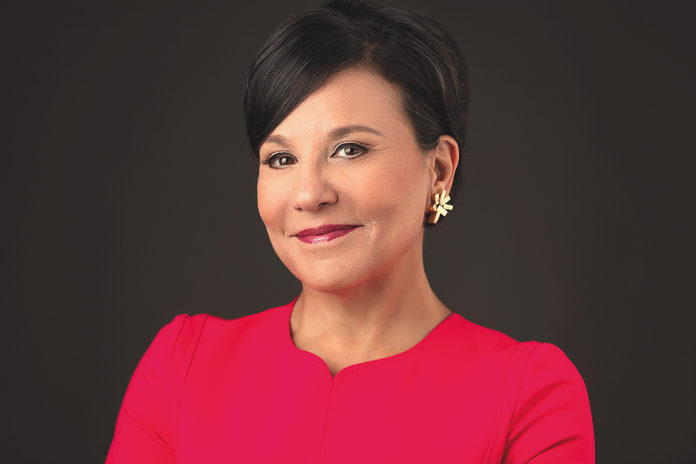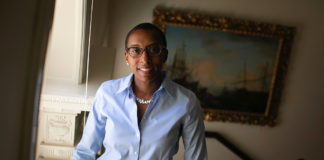
Penny Pritzker ’81, a member of the Harvard Corporation since 2018, has made a $100-million commitment to build a new home for the economics department, the University announced today. Beyond satisfying a long-term need for the economics faculty, the gift suggests some of the ways in which the Corporation’s role has evolved.
The Gift: Enabling Twenty-First Century Economics
The economics department, which lists 55 faculty members on its current roster, is a nationally ranked powerhouse: according to the University news announcement, economics faculty members have earned 11 Nobel Prizes. It is also a large teaching presence, with an average of 220 undergraduate concentrators per recent class (out of about 1,650 students per cohort), and about 190 doctoral students (including those in joint programs with other Harvard schools). Pritzker herself was an economics concentrator, according to the news announcement. President Lawrence S. Bacow said in the announcement:
Penny Pritzker is everything we hope an alum will be—an accomplished and principled leader, a true and tireless public servant, and a loyal supporter of Harvard and of other institutions devoted to the pursuit of knowledge and the expansion of economic opportunity. Many organizations have benefited from the time and resources that she and her husband, Bryan, have generously shared, and we are incredibly grateful for this extraordinary gift. It will create tremendous opportunities for our students and our faculty, as well as all those who will benefit from their work.
For years, faculty members have sought better space than now afforded by Littauer Center, which was built in 1938 at the home for the Graduate School of Public Administration (which became the Kennedy School of Government in 1966). Littauer’s small faculty offices, densely packed along corridors, are not especially accommodating to collegial scholarship, and the facility is ill-adapted to contemporary economics research, which is often staffed by large teams on the scale of modern scientific laboratories, with their numerous postdocs, doctoral students, and technicians. This gift promises to transform the department’s space and enhance its operations, while underscoring Harvard’s belief in the long-term importance of residential teaching, learning, and research—even as the coronavirus pandemic continues to challenge old norms and expectations about space and co-location.
Faculty of Arts and Sciences dean Claudine Gay said in the announcement:
Our economics faculty—some of the world’s most respected, acclaimed, and influential researchers and educators—are collaborating in new and enhanced ways within the department and across the university, as well as with peers and practitioners beyond Harvard. I share Penny’s excitement that the gift will help support an exceptional new generation of Harvard economics leaders, giving them the tools and spaces they need to advance bold new ideas including a focus on equity and opportunity—furthering the entire department’s capability to enable real difference in the world.
Pritzker said:
Today’s faculty and students…want to create more ladders of opportunity in our society and inspire future generations of civic-oriented leadership. “Those goals motivated me to support their incredible, cutting-edge work to understand the drivers of a more inclusive economy for more people across our nation and the world. I hope this gift will enable and galvanize a new era for Harvard economics, with a spectacular building that will support and accelerate collaborative approaches to teaching and research not just within the department but across the University. I am confident that the resulting discoveries from this collaborative work can contribute to a broader understanding throughout our country and the world.
Pritzker’s commitment may be recent, as the announcement omitted details such as where the new facility will be located, its prospective size and design, when it might come online, and the future use of Littauer Center—yet it did note that “Planning will begin to match academic needs with the physical features and design of the new building, set to be located on Harvard’s Cambridge campus near the location of the department’s current home.” The announcement cited professor of economics Amanda Pallais, who expressed enthusiasm about “many more interactions among faculty and students” and the prospect of enabling “the entire faculty to thrive in one building,” alongside their research teams. She also pointed to the potential for “graduate students to be in the same building as professors,” facilitating consultations.
Depending on the size, ambition, and ultimate design of the structure, faculty members might realize those dreams without altering their commutes. The nearest open space on “Harvard’s Cambridge campus” proximate to the “department ‘s current home” is the lawn and parking area between the rear facade of Littauer Center and the Law School’s Austin Hall.
The Donor: A Philanthropic Family
When Pritzker was elected a fellow of the Corporation, senior fellow William F. Lee hailed her for bringing “an extraordinary range and depth of experience across the public, private, and nonprofit sectors, together with decades of close engagement with Harvard and education more generally.”
A prominent member of a leading Chicago business family, Pritzker has long been involved with her alma mater (and was in fact scheduled to help steer The Harvard Campaign until President Barack Obama appointed her to be U.S. Secretary of Commerce, where she served until 2017; her first-year roommate, Elizabeth Sherwood-Randall, was deputy secretary of energy, and they were joined on a class of 1981 thirty-fifth reunion panel in 2016 by attorney general Loretta E. Lynch).
Her business experience has spanned real estate, hospitality, financial services, and other industries in which the Pritzkers have significant interests. She is now chair of PSP Partners, a global private investment firm, which she founded, and a member of the Microsoft board and chair of the Carnegie Endowment for International Peace, among other commitments. (She is also a past trustee of Stanford, from which she earned her J.D. and M.B.A. degrees.)
At Harvard, where she was elected to the Board of Overseers in 2002, Pritzker served on visiting committees for the Harvard Art Museums, the College, the Graduate School of Design, and the Graduate School of Education. In 2011, she was appointed a founding member of the Corporation’s committee on facilities and capital planning, following the reforms in governance adopted in late 2010—a natural fit, given her real-estate experience, and perhaps the best possible vantage point for insight into the development of Allston as the science and engineering complex took shape, and as other University building priorities were sorted out in the course of the then-evolving capital campaign. Another member was Thomas Glynn. Shortly after Harvard Allston Land Company was established in 2018 to develop the commercial enterprise research campus there, with Glynn as CEO, Pritzker was named to its board—an obvious way to continue her University service and draw on her expertise.
Pritzker and her husband, Dr. Bryan Traubert, have supported work on childhood obesity at the public-health school. The redesign of Cabot Science Library and reconfiguration of the heavily used common spaces there, now collectively named Pritzker Commons, reflect her support during the campaign. Working now with the economics department maintains Pritzker’s engagement in that part of campus: Littauer is the building immediately to the west of the Science Center.
Pritzker family members have been notable supporters of higher education. Among recent examples, J.B. Pritzker and M.K. Pritzker made a $100-million naming gift to Northwestern University’s School of Law in 2015, and in 2019, the Pritzker Foundation committed $100 million to launch the University of Chicago’s Pritzker School of Molecular Engineering. Now Penny Pritzker has made her own nine-figure gift, to her alma mater.
The Changing Corporation: Fiduciaries, and Capital Campaigners
The Harvard Corporation has long had at least one member whose service to the University included a talent—and a passion—for fundraising. At the conclusion of the $2.6-billion University Campaign in May 2000, President Neil L. Rudenstine, in a mellow and relaxed mood, said of Robert G. Stone Jr. ’45, L.H.D. ’03—senior fellow, national co-chair of the campaign, and fundraiser nonpareil—“Bob Stone’s long and large shadow quickly became one of the icons of the fund drive: instantly recognizable far in the distance, it allowed plenty of time for people to dive off their respective boulevards into the surrounding shrubbery, or simply scatter indiscriminately.” (Lest any prospect escape, Stone cornered them at the New York Yacht Club, or pinned them in window seats on the New York shuttle, while occupying the aisle and making his pitch.) He was particularly interested in scholarships, the focus of much of his own Harvard philanthropy.
Corporation member James F. Rothenberg ’68, M.B.A. ’70—who was also University treasurer and chair of the Harvard Management Company board—was a driving force behind the $9.6-billion Harvard Campaign, and served as co-chair; he hosted President Drew Faust on West Coast and Latin American development trips, and personally supported professorships and renovation of the undergraduate Houses.
With the expansion of the Corporation’s size after 2010, and the growth of its fundraising ambitions, the role of fellows-as-fundraisers appears to have expanded as well. Boston business leader Joseph J. O. Donnell ’67, M.B.A. ’71, appointed in 2011, was endlessly active in fundraising, served as an energetic co-chair of The Harvard Campaign, and, with his wife, Katherine A. O’Donnell, gave a $30-million lead gift in 2012. Paul J. Finnegan ’75, M.B.A. ’82, a member of the Corporation since 2012 and Rothenberg’s successor as University treasurer in 2014, also served as a co-chair of the campaign (and as co-chair of the Graduate School of Education’s campaign, and vice chair of the Harvard Business School campaign), and has endowed professorships, a coaching position, and more.
Pritzker in effect succeeded O’Donnell as a Corporation member, bringing to the board both in-depth knowledge of Harvard’s building plans and, obviously, a capacity for fundraising informed and fueled by lifelong engagement with the University. She serves alongside David M. Rubenstein, the co-founder and co-CEO of The Carlyle Group, one of the world’s largest private-equity and alternative-asset-management firms.
Rubenstein, elected in 2016 for service beginning in July 2017, in a double-succession following the death of Rothenberg and the retirement of Duke president emerita Nannerl Keohane, has close family ties to Harvard, and has played multiple roles in University fundraising, including co-chairing The Harvard Campaign, chairing the Kennedy School’s campaign, and serving as interlocutor with Bill Gates ’77, LL.D. ’07, during the campaign kickoff event, and with Melinda French Gates at Radcliffe Day this past May. As philanthropist, Rubenstein has helped expand the National Archives, repair the Washington Monument, restore Monticello and Mount Vernon, expand the Kennedy Center for the Performing Arts, and endow Duke’s rare book library. Locally, he donated $15 million in fellowship funds at the Kennedy School, and is recognized in the naming of part of its renovated campus.
As its most recent fundraising effort shows, Harvard is an ambitious research university, with financial ambitions to match. It comes as no real surprise that the expanded Corporation has brought aboard both broader expertise—in law, business, higher education, and knowledge of technology and global affairs—and greater fundraising prowess. The latter includes the ability and willingness to solicit gifts, on a huge scale, in support of the University’s aspirations—and, among at least a few Corporation members, the capacity to lead that effort by example.
Peer institutions are emerging from the pandemic comparably busy—and, one presumes, engaging supporters on a similar scale. Yale is on the brink of unveiling the public phase of its next fund drive, and Princeton appears to be on the verge, too. At Harvard, some of the facilities released when the School of Engineering and Applied Sciences occupied its new Allston premises last academic year are already being evaluated for ultimate adaptation and reuse, and now, it appears, Littauer can be added to the queue of buildings awaiting (expensive) reconfiguration—perhaps early entries on the wish list for the next Crimson capital campaign.







